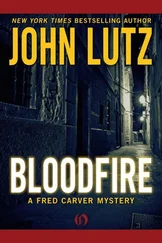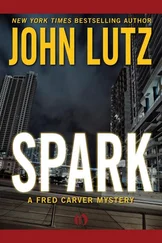John Lutz - Burn
Здесь есть возможность читать онлайн «John Lutz - Burn» весь текст электронной книги совершенно бесплатно (целиком полную версию без сокращений). В некоторых случаях можно слушать аудио, скачать через торрент в формате fb2 и присутствует краткое содержание. Жанр: Триллер, на английском языке. Описание произведения, (предисловие) а так же отзывы посетителей доступны на портале библиотеки ЛибКат.
- Название:Burn
- Автор:
- Жанр:
- Год:неизвестен
- ISBN:нет данных
- Рейтинг книги:4 / 5. Голосов: 1
-
Избранное:Добавить в избранное
- Отзывы:
-
Ваша оценка:
- 80
- 1
- 2
- 3
- 4
- 5
Burn: краткое содержание, описание и аннотация
Предлагаем к чтению аннотацию, описание, краткое содержание или предисловие (зависит от того, что написал сам автор книги «Burn»). Если вы не нашли необходимую информацию о книге — напишите в комментариях, мы постараемся отыскать её.
Burn — читать онлайн бесплатно полную книгу (весь текст) целиком
Ниже представлен текст книги, разбитый по страницам. Система сохранения места последней прочитанной страницы, позволяет с удобством читать онлайн бесплатно книгу «Burn», без необходимости каждый раз заново искать на чём Вы остановились. Поставьте закладку, и сможете в любой момент перейти на страницу, на которой закончили чтение.
Интервал:
Закладка:
“Are you still wearing the support around your ribs?” Desoto asked.
“No, I removed it yesterday.”
Desoto seemed to savor his spumoni. “Time heals everything eventually.”
“I’d like to think that,” Carver said, “but I’m not so sure.”
“Me neither, I suppose,” Desoto said. “Having been raised Catholic.”
They’d met at the restaurant and had separate cars, so Carver finished his coffee then left Desoto to enjoy the sin of gluttony.
Carver got into the Olds and started the engine, then the air conditioner. The meeting with Desoto hadn’t been the only reason he’d driven into Orlando. Beth had told him which adoption agency the Brants had visited before the fatal accident, and it had an Orlando address.
It was only ten minutes away from the restaurant on Washington.
31
The Edgeworth Agency was in a modern glass-and-steel building that reflected the sun with an eye-aching blue brilliance and whose lobby directory boasted several law offices. Carver supposed that juxtaposition of services made good sense, as he rode a gleaming steel elevator like a rocket to the fifth floor.
Despite the sleek modernity of the building, the offices of the Edgeworth Agency were comfortably cluttered. A young man with unruly dark hair and a harried expression sat behind a desk that was almost invisible beneath various pieces of electronic office equipment, fanned-out papers, and a sheet of crinkled aluminum foil on which rested a half-eaten turkey sandwich. His white shirt was rumpled, his tie was loosely knotted, and when he looked up and saw Carver he appeared startled.
“It’s not always like this around here,” he said, smiling uneasily as if he’d been caught reading pornography. “I’m, uh, trying to get some paperwork in order.”
The name plaque on the desk said he was Jim Martinelli. Carver introduced himself.
“I’d like to ask some questions concerning a woman who came here about six months ago and inquired about adopting a child,” he said.
Martinelli looked worried, then immediately relieved, “You’d want to talk to Ms. Atkinson. I’ve only been here a little over three months.”
Carver nodded, waiting.
“Oh!” Martinelli said. “Just a moment. Please.” He backed to a door, opened it, and disappeared into an inner office.
A minute later he came out. “She’ll see you-Ms. Atkinson will.” He stood aside, holding the door open for Carver but not leaving him much room to pass. Carver considered bearing down with the tip of his cane on Martinelli’s toe, then decided there was probably nothing wrong with the flustered lad that a few years without a sore foot wouldn’t cure.
Ms. Atkinson’s brass desk plaque said her first name was Ellen. She was in her forties, with a tightly sprung blond hairdo, bright red lipstick, and a smile as wide as a clown’s. As soon as Martinelli had closed the door and gone back to his wild paperwork, Ms. Atkinson shook her head with weary tolerance.
“Jim tells me you want to know about something that happened here six months ago,” she said. She’d stood up when Carver entered. She was slender and wonderfully proportioned. Her crisp gray business suit, white blouse, and fluffy blue polka-dot bow tie seemed styled and tailored just for her and reminded Carver of Desoto. Now she sat back down. Her office was as neat as Martinelli’s was sloppy. She motioned an invitation for Carver to sit in a light oak and brown leather Danish chair in front of her desk.
Carver sat leaning forward slightly with both hands resting on the crook of his cane. He said he wondered if she remembered Portia Brant.
She studied him with bright and intelligent gray eyes. Though she wore little makeup other than the glaring lipstick, her complexion was smooth and unblemished except for a mole slightly off-center on the point of her jaw. “It’s our policy not to reveal information about any of our clients,” she said. “Confidentiality is taken seriously here.”
“Here, too,” Carver said. “But Portia Brant wasn’t actually your client. I believe she came here and inquired about an adoption. If you’re still concerned about confidentiality, I can tell you she’s deceased.”
Ellen Atkinson worried a pencil that was lying on her green felt desk pad, rolling it back and forth with alternating motions of the forefinger and middle finger of her right hand, as if pretending the fingers were legs and her hand was a miniature lumberjack logrolling on a tiny hexagonal log. “I remember Portia Brant,” she said, “because of the accident.”
“Have you seen her husband Joel since they were here?”
“She was never here with her husband, Mr. Carver. She came here twice, alone.”
“Was she serious about adopting a child?”
The lumberjack stepped off the log. Ellen Atkinson forgot about playing with the pencil and sat back. “Who are you, Mr. Carver?”
Carver considered using the old insurance agent con. Or maybe dropping indirect hints that he was with the police. Neither seemed the right thing to do. With Ellen Atkinson, he decided on the truth.
“Interesting,” she said, when he was finished.
“Was Portia Brant serious about adopting?” he asked again.
“Oh, quite serious. In fact, she wanted a child-an infant- desperately. She was adopted herself, she told me, so she had insight. She said she knew what an adopted child needed.”
“Why did she come here alone? Didn’t she want her husband to know?”
“I never got that impression. She told me she was doing the preliminaries, and she’d bring him with her when they were actually ready to apply to adopt. It isn’t easy, you know. And we’re merely what you might call go-betweens in the process: we match prospective parents to child, provide legal advice, then counseling services after the adoption. It’s rewarding work, Mr. Carver.” Again her wide, infectious smile.
“I can imagine. When was the last time she was here?”
“Less than a week before she died. That’s why I remember her so clearly. I was horrified when I read about the accident in the paper. A drunk driver. . such a shame. She was a beautiful and kind woman. Very active in charity work, you know.”
Carver agreed that it was a shame a woman like Portia Grant had to die because of a drunk driver, and he said he knew about the charity work.
“She’d told me she was bringing her husband next time,” Ellen Atkinson said, “and that they were planning to begin the actual process of adoption.” She shuddered as if she were chilled, burrowing her chin down into her voluminous silk bow tie until her mole was invisible. “They never kept the appointment, of course.”
“Did she talk as if her own childhood had been difficult?”
“Yes and no. Her adoptive parents were quite well off, and there was plenty of love in the family. But it was a surprise to her when they told her in her teen years that she was adopted. I think one of the reasons she wanted to adopt so much was that her childhood was a happy one. She was grateful, and she felt she had a debt that she could repay by giving another unwanted child a home. It’s not an uncommon reaction.”
“Good,” Carver said, smiling. “Did she say her husband was also enthusiastic about adopting?”
“Not directly that I can recall. But I assume he felt the same way, or she wouldn’t have come to us.” The many-lined phone on Ellen Atkinson’s desk trilled, and she excused herself and answered it. She said, “Yes, yes, of course, just a minute,” then covered the mouthpiece with her hand and started to say something to Carver.
He raised his hand in a goodbye, mouthed “Thank you,” and stood up.
She nodded to him, then said, “Yes, yes, of course,” into the phone again as he was leaving.
Читать дальшеИнтервал:
Закладка:
Похожие книги на «Burn»
Представляем Вашему вниманию похожие книги на «Burn» списком для выбора. Мы отобрали схожую по названию и смыслу литературу в надежде предоставить читателям больше вариантов отыскать новые, интересные, ещё непрочитанные произведения.
Обсуждение, отзывы о книге «Burn» и просто собственные мнения читателей. Оставьте ваши комментарии, напишите, что Вы думаете о произведении, его смысле или главных героях. Укажите что конкретно понравилось, а что нет, и почему Вы так считаете.












